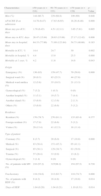The true role of the age in the prognosis of patients admitted in the ICU is not known. This work analyzes the influence of age on the duration of the stay and mortality of patients who remain in an Intensive Care Unit (ICU) for a long period of time.
Patients and methodA retrospective, observational study was performed with patients hospitalized ≥14 days in the ICU. Three age groups were established: <50, 50–70 and >70 years. The influence of different factors on the relationship existing between stay and age was studied. In addition, stay and survival in the ICU, hospital and at one year were analyzed based on the groups.
ResultsA total of 707 patients were included. Significant differences in hospital stay (p=.183) were not found among the three groups. The older group, which showed greater severity on admission, was the group undergoing the most tracheostomies (74.7%) and extrarenal purification (HDF) (10.8%). When the influence of factors such as APACHE II, pre-ICU stay, origin, tracheostomy or hemodiafiltration (HDF) were analyzed, no relation was found between stay and age of patient. Survival decreased as age increased.
ConclusionsNo differences were found in stay based on age, although a difference was found in mortality.
No se conoce cuál es el verdadero papel de la edad en el pronóstico de los pacientes ingresados en las Unidades de Cuidados Intensivos (UCI). En este trabajo se analiza la influencia de la edad en la duración de la estancia y en la mortalidad de los pacientes que permanecen de forma prolongada en una UCI.
Pacientes y métodoEstudio retrospectivo observacional, con pacientes ingresados ≥14 días en UCI. Se establecieron 3 grupos de edad: menores de 50, entre 50–70 y mayores de 70 años. Se estudió la influencia de diferentes factores en la relación existente entre estancia y edad; además se analizó la estancia y la supervivencia en las UCI, hospitalaria y al año en función de los grupos.
ResultadosSe incluyeron 707 pacientes. No se encontraron diferencias significativas entre los 3 grupos en la estancia hospitalaria (p=0,183). El grupo de mayor edad, que presentaba una mayor gravedad al ingreso, fue el que se sometió a más traqueotomías (74,7%) y de depuración extrarrenal (HDF) (10,8%). Al analizar la influencia de factores tales como el APACHE II, la estancia pre-UCI, la procedencia, la traqueotomía o las HDF, no se encontró relación alguna entre la estancia y la edad del paciente. La supervivencia decrecía a medida que se incrementaba la edad.
ConclusionesNo se hallaron diferencias en la estancia en función de la edad, aunque sí en la mortalidad.
Article
Diríjase desde aquí a la web de la >>>FESEMI<<< e inicie sesión mediante el formulario que se encuentra en la barra superior, pulsando sobre el candado.

Una vez autentificado, en la misma web de FESEMI, en el menú superior, elija la opción deseada.

>>>FESEMI<<<







